Dashka Slater, Ned Blackhawk, Lorraine Boissoneault, Alice Driver Named Winners of the 2024 J. Anthony Lukas Prize Project Awards
The awards ceremony will take place on Tuesday, May 7, at Columbia Journalism School.
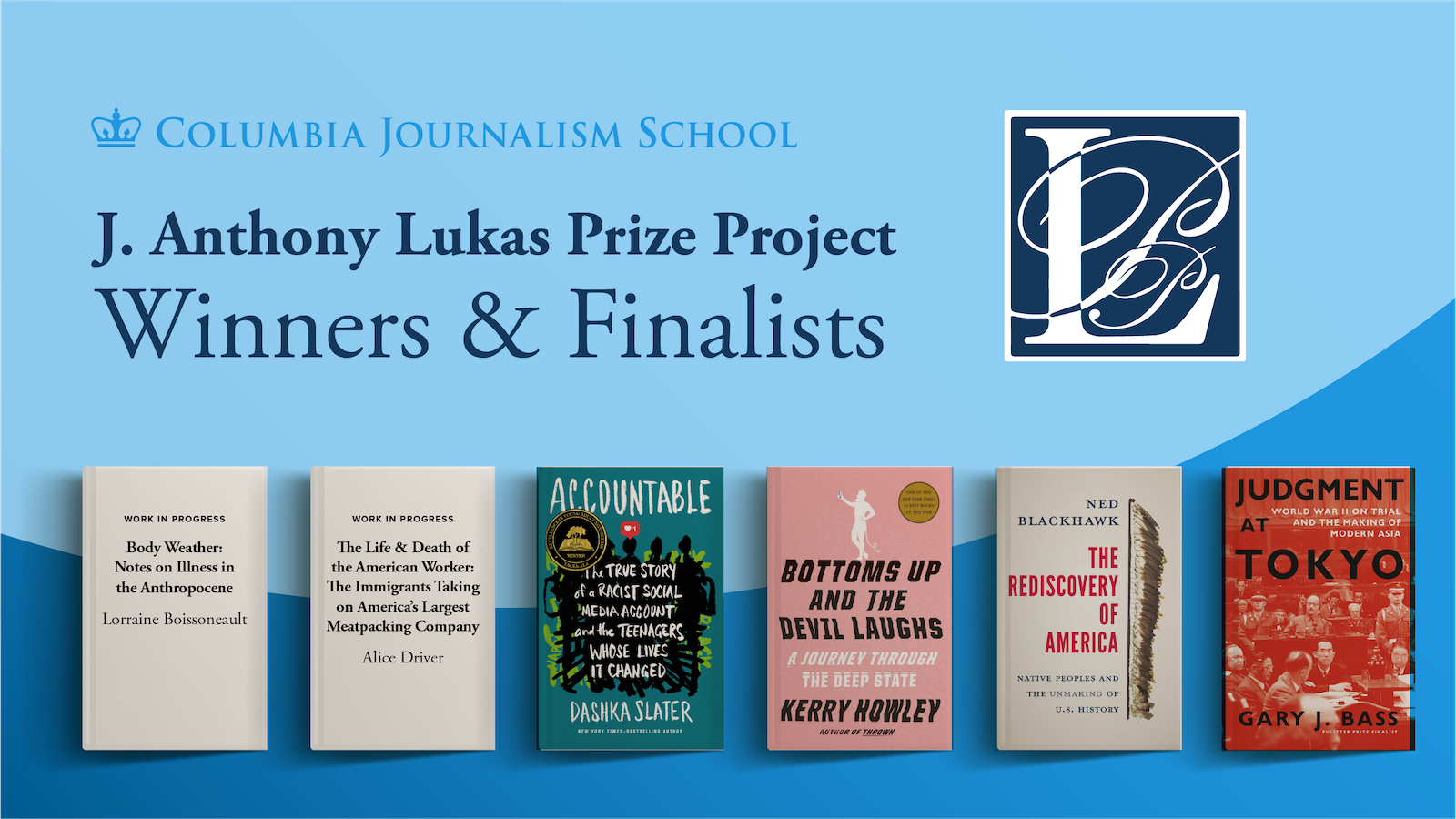
Columbia Journalism School and the Nieman Foundation for Journalism at Harvard are pleased to announce the four winners and the two finalists of the 2024 J. Anthony Lukas Prize Project Awards. The Lukas Prizes, established in 1998 and consisting of the J. Anthony Lukas Work-in-Progress Awards, the J. Anthony Lukas Book Prize and the Mark Lynton History Prize, honor the best in American nonfiction writing.
The awards ceremony will take place on Tuesday, May 7, at Columbia Journalism School.
Winners and Finalists of the 2024 Lukas Prizes
J. Anthony Lukas Work-in-Progress Award Winners
- Lorraine Boissoneault, Body Weather: Notes on Illness in the Anthropocene (Beacon Press)
- Alice Driver, The Life and Death of the American Worker: The Immigrants Taking on America’s Largest Meatpacking Company (One Signal)
J. Anthony Lukas Book Prize
- Winner: Dashka Slater, Accountable: The True Story of a Racist Social Media Account and the Teenagers Whose Lives It Changed (Farrar, Straus & Giroux)
- Finalist: Kerry Howley, Bottoms Up and the Devil Laughs: A Journey Through the Deep State (Knopf)
Mark Lynton History Prize
- Winner: Ned Blackhawk, The Rediscovery of America: Native Peoples and the Unmaking of U.S. History (Yale University Press)
- Finalist: Gary J. Bass, Judgment at Tokyo: World War II on Trial and the Making of Modern Asia (Knopf)
About the Prizes
Established in 1998, the J. Anthony Lukas Prize Project honors the best in American nonfiction writing. Co-administered by the Columbia University Graduate School of Journalism and the Nieman Foundation for Journalism at Harvard, and sponsored by the family of the late Mark Lynton, a historian and senior executive at the firm Hunter Douglas in the Netherlands, the Lukas Prize Project annually presents four awards in three categories.
J. Anthony Lukas Work-In-Progress Awards (two $25,000 prizes)
The J. Anthony Lukas Work-in-Progress Awards are given annually to aid in the completion of significant works of nonfiction on American topics of political or social concern. These awards assist in closing the gap between the time and money an author has and the time and money that finishing a book requires. Judges this year: Chris Jackson (chair), Erika Hayasaki and Philip Turner.
Lorraine Boissoneault, Body Weather: Notes on Illness in the Anthropocene (Beacon Press)
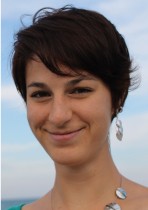
Lorraine Boissoneault is a Chicago-based journalist whose work covers science, human rights, history and health. Currently a writer for the educational web series “Real Science” and host of the show “Archeology Quest,” she previously worked as the staff history writer for Smithsonian Magazine. Her work has also appeared in National Geographic, Believer Magazine, The New Yorker, Great Lakes Now, Hakai, PassBlue and The Atlantic. Her first book, The Last Voyageurs, was a finalist for the 2016 Chicago Book of the Year Award. She is a graduate of Columbia Journalism School.
Body Weather is a book about living with chronic illness in a world undergoing rapid climate change. By focusing on the author’s personal experience, it illuminates the subtle connections between our bodies and the planet’s meteorology. The narrative examines multiple elements of weather, from temperature to fires and floods, while interspersing stories of autoimmune diseases that affect nearly all body systems and afflict tens of millions of women. Four years into a global pandemic that has killed millions and left millions more newly disabled, Body Weather emphasizes the resourcefulness of the chronically ill, while also highlighting the sexism, racism and ableism that still permeate the medical field. Body Weather tells a story of resilience in the face of suffering, paired with scientific research, history and a keen exploration of the layered chaos of 21st century life.
Judges’ citation
Body Weather: Notes on Illness in the Anthropocene is a visceral work of reported essays, masterfully braided with narrative research. Lorraine Boissoneault tells the story of living with chronic illness at a time when the planet is in a state of dire suffering. Climate change is bringing more hurricanes, lightning, tornadoes, fires and landslides. How will a distressed planet affect stressed, ill or disabled bodies? In poetic and haunting prose, Boissoneault unearths intersections between her unique experience living with illness, while also illuminating universal questions lodged within all of us: How do we learn to live with discomfort? “How do we seek refuge from our own bodies, from weather that wraps itself around the world?” The Lukas Prize will enable the author to travel from her home base in Chicago to the Saguenay fjord in northern Quebec, to Death Valley in California and to Australia’s outback to complete reporting for the book. Body Weather is a singular work of literary reportage, a firsthand, intimate account drawing profound connections between the body and the planet.
Alice Driver, The Life and Death of the American Worker: The Immigrants Taking on America’s Largest Meatpacking Company (One Signal)
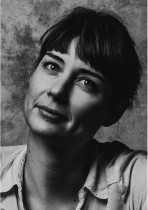
Alice Driver is a James Beard Award-winning writer from the Ozark Mountains in Arkansas. She is the author of More or Less Dead and the forthcoming Artists All Around, a memoir about her family’s relationship with author and illustrator Maurice Sendak. Driver is the translator of Abecedario de Juárez.
By shining a light on the lives of the immigrant laborers from marginalized communities who prepare our food, The Life and Death of the American Worker unmasks Tyson Foods, the largest meat-processing company in the U.S. Based in Arkansas, Tyson Foods relies overwhelmingly on immigrants and refugees to do the difficult and dangerous daily labor of processing chicken. During the pandemic, workers from Mexico, Central America, the Marshall Islands, Afghanistan, Vietnam and Myanmar — many of whom only speak their native language — faced working conditions at meatpacking plants that would kill them in greater numbers than any other place in the U.S. except prisons. Laying bare a system of immigration law and labor exploitation that values infinite growth at the expense of human beings, The Life and Death of the American Worker will forever change the conversation on labor conditions and the meaning of work.
Judges’ citation
The Life and Death of the American Worker is a rigorously researched work of narrative nonfiction that exemplifies the spirit of holding powerful institutions accountable, while humanizing the individuals who have been systematically dehumanized by immigration law and unregulated labor practices. Powerful forces have tried to silence the project and the people who are part of it. Yet with deep access and empathy, Alice Driver tells the multifaceted stories of families who have filed a class-action lawsuit to hold Tyson responsible for the working conditions that caused the deaths of their loved ones. She conducted interviews in the various native languages of subjects, and the Lukas Award will go toward some of those translations. Although many journalists have held temporary jobs within meatpacking plants to write about the industry, Driver (who is from Arkansas and grew up around Tyson employees) is solely focused on the longterm experiences of immigrant workers who have been at Tyson for decades. Driver has performed a remarkable feat of investigative and narrative reporting in telling the stories of these essential yet often overlooked and exploited workers.
J. Anthony Lukas Book Prize ($10,000)
The J. Anthony Lukas Book Prize recognizes superb examples of nonfiction writing that exemplify the literary grace, commitment to serious research and original reporting that characterized the distinguished work of the award’s namesake, J. Anthony Lukas. Books must be on a topic of American political or social concern published between January 1 and December 31, 2023. Judges this year: Masha Gessen (chair), Kurt Andersen, Suzy Hansen and Linda Villarosa.
Winner: Dashka Slater, Accountable: The True Story of a Racist Social Media Account and the Teenagers Whose Lives It Changed (Farrar, Straus & Giroux)

Dashka Slater has written for such publications as The New York Times Magazine, Newsweek and Salon. Her New York Times-bestselling true crime book for teens, The 57 Bus, received numerous accolades, including the Stonewall Book Award, the California Book Award and a Boston Globe-Horn Book Honor. It was named one of Time magazine’s “100 Best Young Adult Books of All Time” and was included on more than 20 “best books of the year” lists. The author of books for children and adults, Slater teaches in Hamline University’s MFA in Writing for Children and Young Adults program. She lives in Oakland, California.
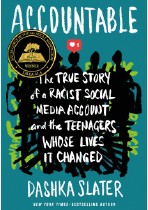
Accountable, the winner of the YALSA Award for Excellence in Nonfiction, recounts the story of a racist social media account that changes everything for a group of teens. When a high school student started a private Instagram account that used racist and sexist memes to make his friends laugh, he thought of it as “edgy” humor. Over time, the edge got sharper. Then other kids found out about the account. Soon, everyone knew.
Ultimately no one in the town of Albany, California, was safe from the repercussions of the account’s discovery. In the end, no one was laughing. And everyone was left asking: Where does accountability end for online speech that harms, and what does accountability even mean?
Judges’ citation
For the first time, the Lukas Prize is awarded to a book aimed at a young adult audience. Accountable embodies the best of the Lukas tradition of deep reporting and compassionate storytelling. Dashka Slater uses a paper trail of court documents, police reports, texts, emails, social media posts and even poetry — along with hundreds of hours of first-person interviews — to construct a portrait of a school and a community in crisis. With honesty and authenticity, Slater gets into the minds and under the skin of a group of teenage subjects as well as the flailing adults ripped to shreds by the toxic power of online speech. Accountable confronts sticky questions of race, class and gender head-on and with care, resulting in an explosive, page-turning masterwork.
Finalist: Kerry Howley, Bottoms Up and the Devil Laughs: A Journey Through the Deep State (Knopf)

Kerry Howley is a feature writer at New York magazine and the author of Thrown, a New York Times Editors’ Choice and pick for best-of-the-year lists in Time, Salon, Slate, The New York Times Magazine and many other venues. A Lannan Foundation Fellow, she holds an M.F.A. from the University of Iowa, where she was a professor at the celebrated Nonfiction Writing Program until joining New York. She lives in Los Angeles.
A wild, humane and hilarious meditation on post-privacy America, Bottoms Up and the Devil Laughs tells the true story of intelligence specialist Reality Winner, a lone young woman who stuffs a state secret under her skirt and trusts the wrong people to help. After printing five pages of dangerous information that she was never supposed to see, Winner finds herself at the mercy of forces more invasive than she could have possibly imagined. A soap opera set in the “Deep State,” Bottoms Up and the Devil Laughs is a free fall into a world where everything is recorded and nothing is sacred, from a singular writer unafraid to ask essential questions about the strangeness of modern life.
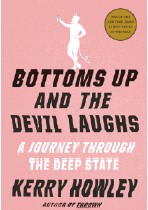
Judges’ citation
Kerry Howley's Bottoms Up and the Devil Laughs is a portrait of a world in which privacy is fading but secrets abound. A handful of Howley’s characters divulge classified information in the name of greater public awareness; the results are invariably disastrous. A beautifully written, entirely original book, Bottoms Up describes a time and a world that has too much information to know itself. Some retailers have described the book as a biography of Reality Winner. They are wrong, but the miscategorization affirms one of the book’s insights: in the age of data collection, a life can look like a series of location check-ins, internet rabbit holes and other people’s impressions. After following Howley’s clear-eyed journey through the information woods, the reader emerges with their assumptions shaken, neurons rearranged and something like an understanding taking shape.
Mark Lynton History Prize ($10,000)
The Mark Lynton History Prize is awarded to the book-length work of narrative history, on any subject, that best combines intellectual distinction with felicity of expression. Books must have been published between January 1 and December 31, 2023. Judges: William G. Thomas III (chair), Marcia Chatelain, Andrés Reséndez and Elizabeth Taylor.
Winner: Ned Blackhawk, The Rediscovery of America: Native Peoples and the Unmaking of U.S. History (Yale University Press)
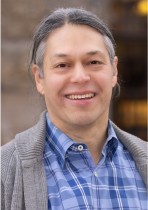
Ned Blackhawk (Western Shoshone) is the Howard R. Lamar Professor of History and American Studies at Yale University, where he is the faculty coordinator for the Yale Group for the Study of Native America. He is the author of Violence over the Land: Indians and Empires in the Early American West. He lives in New Haven, Connecticut.
The most enduring feature of U.S. history has been the presence of Native Americans. Yet most American histories give scant attention to how Native Americans have shaped American history, even though Indigenous history has grown into one of the 21st century’s most dynamic fields of historical inquiry.
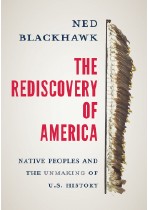
The Rediscovery of America retells the history of America from the first decades of Spanish colonial exploration to the rise of Native American self-determination in the late 20th century, showing that Native history remains essential to understanding the evolution of modern America. Historian Ned Blackhawk interweaves Native and non-Native histories to expose the centrality of Native Americans to every century of North American historical development: European colonization in the 1600s was never a predetermined success; Native nations centrally shaped England’s crisis of empire; the American Revolution’s first shots occurred over Indian affairs in the interior; and the federal government built much of its administrative capacities in the 19th century through treaty-making and related Indian policies. Accessible and up to date, The Rediscovery of America is one of the few attempts to synthesize over five centuries of Native American history.
Judges’ citation
Ned Blackhawk’s stunning achievement in The Rediscovery of America flows from his opening question: “How can a nation founded on the homelands of dispossessed Indigenous peoples be the world's most exemplary democracy?” What follows is a revelatory, refreshing and necessary reconceptualization of United States history. Blackhawk shows his readers that in encounter after encounter, Native peoples shaped every aspect of U.S. historical development. This painful history includes decades of unrelenting violence, land dispossession, treaty violation and the severing of more than 75,000 Native children from their families to federally funded boarding schools. In the 20th century, the U.S. government seized Native lands for dams, reservoirs, hydroelectric plants, nuclear testing and uranium mining, and after earlier reforms, paradoxically sought to terminate tribal sovereignty. Blackhawk’s sweeping account shows how Native peoples simultaneously determined American policies and were unjustly subject to them. The Rediscovery of America is the most ambitious and creative account of Native American history yet published. In a style both invigorating and urgent, Blackhawk delivers a major new synthesis of the field of Native American history and an elegant, masterful narrative of Native independence and sovereignty.
Finalist: Gary J. Bass, Judgment at Tokyo: World War II on Trial and the Making of Modern Asia (Knopf)
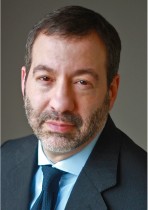
Gary J. Bass is the author of The Blood Telegram, which was a 2014 Pulitzer Prize finalist in general nonfiction and won the Arthur Ross Book Award from the Council on Foreign Relations, the Bernard Schwartz Book Award from the Asia Society, the Cundill Prize in Historical Literature and the Lionel Gelber Prize, among other awards. He is the William P. Boswell Professor of World Politics of Peace and War at Princeton University. His previous books are Freedom’s Battle and Stay the Hand of Vengeance. He has written for The Economist, The New York Times, The New Yorker, The Washington Post, The Atlantic, and other publications.
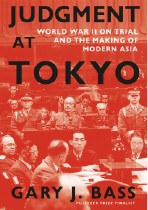
Judgment at Tokyo is a landmark history of the trial of Japan’s leaders as war criminals — the overlooked Asian counterpart to Nuremberg. After World War II, the victorious Allies insisted on putting Japan’s wartime leaders on trial for aggression at Pearl Harbor and shocking atrocities across Asia. The Allies intended for the tribunal to build a more peaceful world under international law and American hegemony. On trial, Japanese leaders retorted that they had fought to liberate Asia from Western imperialism and that the court was victors’ justice. For more than two years, lawyers sparred before clashing Chinese, Indian, Philippine, American, and Soviet judges. Rather than clarity, the trial brought dissension and division that caused international discord between China, Japan and Korea to this day. The product of a decade of research and writing, Judgment at Tokyo is a magisterial history of the years that shaped postwar Asia.
Judges’ citation
Gary Bass’s Judgment at Tokyo is a masterpiece of historical writing. Nuanced, riveting and meticulously researched, Judgment at Tokyo takes readers into the inner workings of the Allies as they prosecuted 28 Japanese leaders after World War II for war crimes and atrocities. An international court of 11 judges took evidence from more than 1,200 witnesses in hearings that lasted two and a half years. Lawyers for the Allies sought to convict Japanese leaders not only of traditional war crimes, such as murdering prisoners of war and killing civilians, but also of a newly formulated charge, the crime of waging an aggressive war against international peace. Many Japanese, suffering from the U.S.-led firebombing campaigns and the two atomic bombs that killed millions of civilians, regarded the Tokyo trial with skepticism and resentment. Defense lawyers for the Japanese argued that Japan had fought the war to liberate Asia from Western colonialism and that the charge of aggressive war had no basis as a crime in international law. Far from resulting in moral clarity, the trial ended in fractious division and dissension. Judgment at Tokyo is a gripping courtroom drama that takes us behind the scenes with the judges, lawyers and U.S. military commanders at the center of the Tokyo trial. Bass renders a definitive, absorbing and eye-opening assessment of the trial’s enduring controversy and moral relevance.
For more information, please contact:
Abi Wright, Professional Prizes
Columbia Journalism School
[email protected]
212-854-6468
About Columbia Journalism School
For 112 years, the Columbia Journalism School has been preparing journalists in programs that stress academic rigor, ethics, journalistic inquiry and professional practice. Founded with a gift from Joseph Pulitzer, the school opened in 1912 and offers Master of Science and Master of Arts degrees, as well as a Master of Science in Data Journalism, a joint Master of Science degree in Computer Science and Journalism, The Knight-Bagehot Fellowship in Economics and Business Journalism and a Doctor of Philosophy in Communications. It is home to the Columbia Journalism Review, and several world-class research centers, including the Brown Institute for Media Innovation, The Tow Center for Digital Journalism, The Ira A. Lipman Center for Journalism and Civil and Human Rights, The Simon and June Li Center for Global Journalism, the Craig Newmark Center for Journalism Ethics and Security, and the Dart Center for Journalism and Trauma. The school also administers many of the leading journalism awards, including the Alfred I. duPont-Columbia University Award, the Maria Moors Cabot Prize, the John Chancellor Award, the John B. Oakes Award for Distinguished Environmental Journalism, the Dart Awards for Excellence in Coverage of Trauma, Paul Tobenkin Memorial Award, the Mike Berger Awards and the WERT Prize for Women Business Journalists.
About the Nieman Foundation for Journalism at Harvard
The Nieman Foundation for Journalism at Harvard educates leaders in journalism and elevates the standards of the profession through special programs that convene scholars and experts in all fields. More than 1,600 journalists from 99 countries have been awarded Nieman Fellowships since 1938. The foundation’s other initiatives include Nieman Reports, a website and print magazine that covers thought leadership in journalism; Nieman Lab, a website that reports on the future of news, innovation and best practices in the digital media age; and Nieman Storyboard, a website that showcases exceptional narrative journalism and explores the future of nonfiction storytelling. www.nieman.harvard.edu